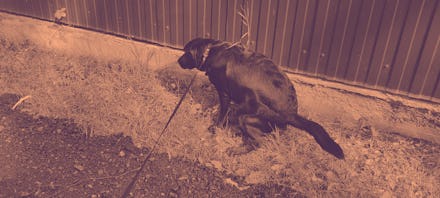Your dog’s poop is an enemy of the environment
But he’s still a very, very good boy.

Have you ever let your dog poop on the ground and just left it there? This is a safe space, so you can be honest. “It’s fertilizer,” you tell yourself. “The plants will love it!” Yeah, well, turns out the plants are all set. According to a new study published in the journal Ecological Solutions and Evidence, there is now so much dog waste being left behind that it is actually damaging to wildlife.
Yes, dog poop can be a good fertilizer for plants — but only under ideal conditions. Composted dog droppings, which are allowed to cook long enough to kill bacteria and any other gross stuff that might have made its way out of your pooch’s backend, can be used as plant food. Any other time though, that little nugget is just a nitrogen bomb.
Researchers studied dog droppings in four different nature preserves outside of Ghent, Belgium, for 18 months. They found that pupper dumps are responsible for contributing 11 kilograms of nitrogen and 5 kilograms of phosphorus per hectare (roughly 2.5 acres). That’s creating air pollution roughly comparable to that of some car traffic, per one study. Free of human (or dog) intervention, ecosystems typically see about 0.5 kilograms of nitrogen deposited each year.
Because these nature reserves are used to lower the levels of nitrogen and phosphorus, the introduction of dog waste and all that it carries creates an overfertilizing effect. This hurts some of the more sensitive plants that call the area home. When those plants can’t grow, it pushes out the wildlife that relies on them for food. Meanwhile, more resilient flora like nettles and hogweed start taking root and thriving, reducing the overall biodiversity in the area and turning it into a survival of the fittest situation instead of the delicately balanced ecosystem that it once was.
The good news is that there is a simple solution: Pick up the poop. Researchers found that in areas where people actually make the effort to bag their dog shit, the phosphorous levels drop down to nearly zero. Keeping dogs on a leash also kept most of the nutrient impact restricted to paths and made it more likely that people would actually pick up the waste.
However, there’s really no getting rid of all of the nitrogen that dogs ditch in the wild because their urine carries it, too, and no one is scooping up the ground that their dog peed on. About half of the nitrogen levels remain even when all poop is collected, and those high levels of nutrients can remain for as long as three years, according to researchers.
The unfortunate reality is that the only way to really counter the impact dogs have on these ecosystems is by banning them entirely. Their effect can be managed by people simply picking up the poop, but of course, this creates a secondary problem: Plastic dog poop bags are also an ecological nightmare, taking up to 500 years to completely degrade. There are bags marketed as “biodegradable” or “compostable,” but the Federal Trade Commission has warned that this claim is often misleading.
If you can, the best thing to do with dog poop is to compost it in its own bin. This not only saves on the plastic bag, but also turns the poop into actually good fertilizer. Beyond that, it’s all about minimizing impact. But don’t get it twisted, your dog is still a very good boy.